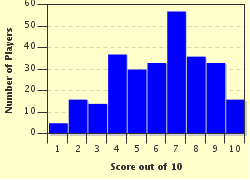Quiz Answer Key and Fun Facts
1. Where did Naomi's husband come from?
2. According to Ruth 1:11-13, what was Naomi's main reason for telling Orpah and Ruth that they should go home to Moab?
3. What was the only thing which Ruth allowed might part her and Naomi?
4. In Ruth 2:5, what was the subject of Boaz's first question to his reapers?
5. What did Boaz give as his reason for his kindness to Ruth, in Ruth 2:11?
6. According to Ruth 2:23, how long did Ruth continue to glean in the fields of Boaz? (NKJV text)
7. Where did Boaz call the elders to witness the agreement between himself and Naomi's kinsman?
8. Why did Naomi's closest kinsman, after first opting to buy (or 'redeem') Elimelech's land, afterwards change his mind and refuse, according to Ruth 4:5-6? (NKJV text)
9. By what then customary sign did Boaz and the other kinsman seal the deal before the elders? (Ruth 4:6-9)
10. So you know Ruth, but do you *understand* the story? What is the most likely reason that Naomi's nearest kinsman is never named?
Source: Author
Rimrunner
This quiz was reviewed by FunTrivia editor
CellarDoor before going online.
Any errors found in FunTrivia content are routinely corrected through our feedback system.


